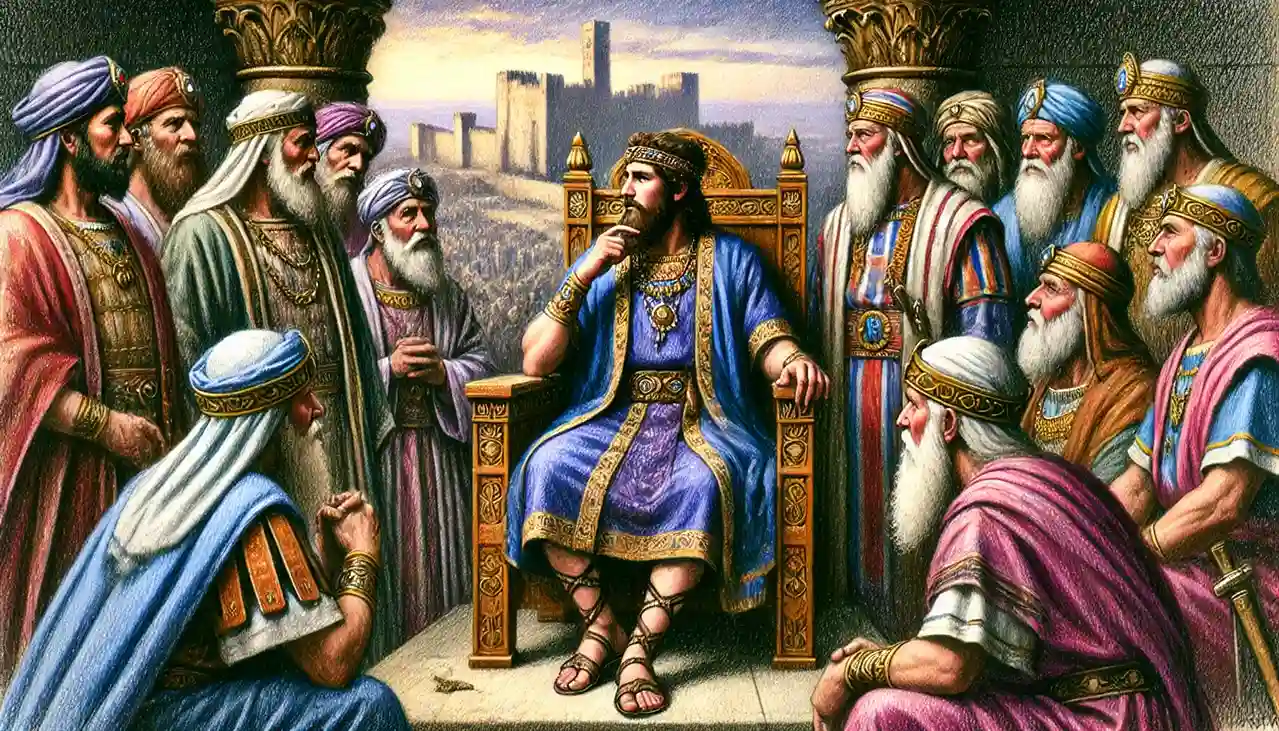
Rehoboam: King of a Divided Kingdom
Rehoboam, the son of Solomon and grandson of David, was the fourth king of Israel and the first king of the Kingdom of Judah. Here are some key facts about Rehoboam:
- Lineage: Rehoboam was the son of King Solomon and Naamah the Ammonite (1 Kings 14:21).
- Reign: Rehoboam began his reign around 931 BC, ruling over the united kingdom of Israel before it split (1 Kings 12:1).
- Kingdom Division: His harsh policies led to the division of the kingdom, with Jeroboam ruling the northern tribes and Rehoboam ruling Judah and Benjamin (1 Kings 12:16-17).
- Advisors’ Counsel: Ignoring the elders’ counsel, he followed the advice of younger advisors to increase the burdens on the people, causing rebellion (1 Kings 12:8-11).
- Conflict: Rehoboam’s reign was marked by continual conflict with Jeroboam and attacks from Egypt under Pharaoh Shishak (1 Kings 14:25-26).
Rehoboam’s reign marked a significant turning point in the history of Israel, characterized by political division, conflict, and a shift in religious practices. As the son of Solomon and grandson of David, Rehoboam inherited a kingdom that was both wealthy and burdened by heavy taxation and forced labor. His approach to governance, influenced by his advisors, led to the division of the united kingdom of Israel into the northern kingdom of Israel and the southern kingdom of Judah.
Accession to the Throne and Division of the Kingdom: Upon Solomon’s death, Rehoboam traveled to Shechem, where the northern tribes had assembled to proclaim him king. The tribes, discontented with Solomon’s heavy yoke, requested that Rehoboam lighten their burdens. Rehoboam consulted two groups: the elders who had served his father advised leniency and servant leadership, while his younger advisors recommended increasing the burdens to assert his authority. Rehoboam chose the latter, declaring, “My father made your yoke heavy; I will make it even heavier” (1 Kings 12:14). This decision alienated the northern tribes, leading them to reject Rehoboam and crown Jeroboam as their king. This event marked the division of the united kingdom into Israel (north) and Judah (south).
Governance and Fortifications: In the southern kingdom of Judah, Rehoboam’s reign involved strengthening his defenses. He fortified several cities to protect against potential invasions and maintain control over his territory (2 Chronicles 11:5-12). These fortifications included Bethlehem, Etam, Tekoa, and Hebron, among others. Despite these efforts, his reign was marked by instability and continual conflict with the northern kingdom of Israel.
Religious Shifts and Idolatry: Rehoboam’s reign saw significant religious shifts. Initially, there was an influx of priests and Levites from the northern kingdom, who left their homes due to Jeroboam’s establishment of calf worship and other non-Yahwistic practices. They migrated to Judah, strengthening the religious life there. However, over time, Judah under Rehoboam’s rule also succumbed to idolatry and pagan practices. High places, sacred stones, and Asherah poles proliferated, leading to spiritual decline and provoking God’s anger (1 Kings 14:22-24).
Egyptian Invasion: In the fifth year of Rehoboam’s reign, Judah faced a significant external threat from Egypt. Pharaoh Shishak (Sheshonq I) invaded Judah, capturing fortified cities and advancing to Jerusalem. This invasion was seen as divine punishment for Judah’s unfaithfulness. Shishak’s forces plundered the treasures of the temple and the royal palace, accumulated during Solomon’s reign, significantly weakening Judah’s wealth and military capability (1 Kings 14:25-26).
Internal Strife and Legacy: Rehoboam’s reign was also marked by internal strife and challenges to his authority. Although he managed to retain control over Judah and Benjamin, his reign was continually troubled by conflict with Jeroboam’s northern kingdom. His harsh policies and failure to heed wise counsel led to a legacy of division and conflict. Rehoboam ruled for 17 years, and his reign underscored the importance of wise and compassionate leadership.
In summary, Rehoboam’s reign is a complex and multifaceted period in biblical history. His decisions led to the division of Israel into two kingdoms, with long-lasting repercussions for both. His rule serves as a cautionary tale about the consequences of ignoring wise counsel and the importance of just and compassionate leadership. Rehoboam’s legacy is a reminder of the fragility of political unity and the enduring impact of leadership choices on a nation’s destiny.



